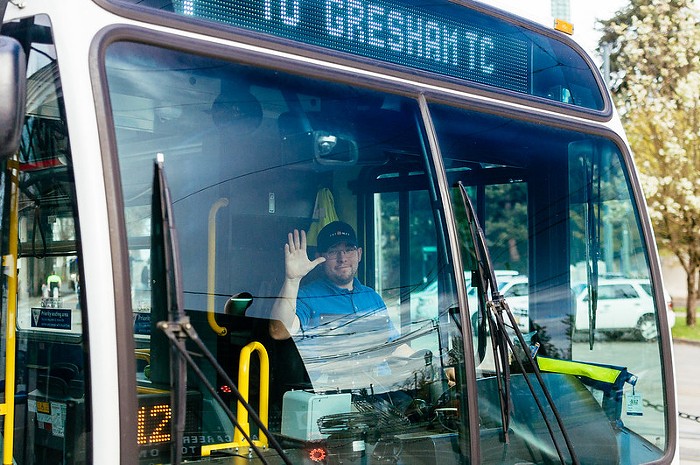In January, TriMet issued its second-ever lifetime ban to Koryn Kraemer, the person accused of chewing off a man’s ear during an attack at a closed TriMet MAX station in Gresham. At the same time, TriMet announced it had also issued two five-year rider bans; one against a rider accused of pushing a child onto the MAX tracks, and another issued to a rider who allegedly hit a transit security officer with their bike handlebars.
As TriMet becomes more independent in its rider ban process, the agency is also building a precedent for how it judges the severity of specific offenses on the transit system. While all rider ban decisions ultimately fall to the agency’s general manager, TriMet spokespeople say criminal charges, the outcome of a rider’s actions, and evidence of the offense all play a role in the length of a rider ban.
Prior to 2017, rider exclusions from TriMet could only be included in a person’s parole, meaning that the public transit agency was reliant on prosecutors and judges working with TriMet to include a rider ban as part of the convicted person’s legal punishment. That process proved to be a challenge with Jared Walter, a rider who developed a pattern of committing various sex crimes on TriMet, being placed on probation with a rider ban, reboarding public transit when his ban was lifted, and reoffending. Walter’s repeat behavior triggered TriMet to develop its own independent rider exclusion process in 2017, allowing the agency to work outside of the law to punish riders who TriMet deemed unsafe to other passengers. Walter received TriMet’s first-ever lifetime ban in 2019 after he was charged with two cases of sexual abuse on MAX trains.
Recently, as declining perceptions of public safety have caused concerns for the agency’s ridership levels, TriMet has further expanded its ability to ban riders from the system. In January 2022, agency board members voted to allow riders who spit on bus operators to be eligible for a rider ban following an increase in assaults against drivers during the pandemic. In December 2022, the board voted again to increase eligibility for rider bans, this time expanding bannable offenses to include attempted felonies in addition to felonies, and violating TriMet code—like littering, using drugs, and using the bus or train as shelter—three times in 90 days. At the time, agency officials explicitly stated that they want to have authority to act faster than the legal criminal justice process. The agency is also currently trying to address perceptions of public safety onboard TriMet as ridership has been slow to rebound since the pandemic, as visible homelessness and a deficit of mental health services has become more apparent throughout the region.
“We at TriMet strive every single day to provide transit services for our community that are safe and reliable,” TriMet General Manager Sam Desue said during a recent board meeting. “But we travel through 533 square miles—three counties—and what happens on our system is a reflection of what’s going on in the communities we serve.”
According to TriMet spokesperson Roberta Altstadt, the length of each recent rider exclusion was based on the severity of the crime the rider has been charged with and the outcome of their alleged behavior. For example, Kraemer was charged with assault in the second degree while Brianna Workman, the woman accused of pushing a child onto the MAX tracks, was arrested and charged with attempted assault.
The impact the incident had on the other riders involved also played a role in the length of the ban. In Workman’s case, the child suffered minor injuries and there was no oncoming train when the child fell onto the tracks, influencing TriMet’s decision to limit her ban to five years. If a MAX train had been rolling down the tracks when Workman allegedly pushed the child, Altstadt said the ban may have been more severe.
In contrast, General Manager Desue called Kraemer’s alleged attack “horrific” and indicated that a lifetime ban was warranted “in case that he is ever released” from prison. Kraemer is currently in custody without bail awaiting trial.
TriMet legal and security staff are responsible for reviewing the cases and recommending them to Desue for possible rider penalties, but Desue is responsible for making the final determination. According to Altstadt, security and legal staff weigh the evidence TriMet has of a rider offense—like video footage, security staff testimony, and other witness statements—to recommend a length for a ban that the legal team believes will hold up against a potential legal challenge. In order to be eligible for a rider ban, TriMet must be able to prove the rider committed an eligible serious offense based on a “preponderance of the evidence,” meaning that there is a greater than 50 percent chance the rider committed the offense.
TriMet allows riders to challenge bans and rider penalties, and anyone served with a lifetime ban can ask the agency to reconsider the ban once per year. If a rider is banned from TriMet based on a crime that a criminal court later finds them not guilty of, the verdict could be presented in the rider’s challenge of the ban, but it doesn’t automatically mean that the ban would be rescinded.




















